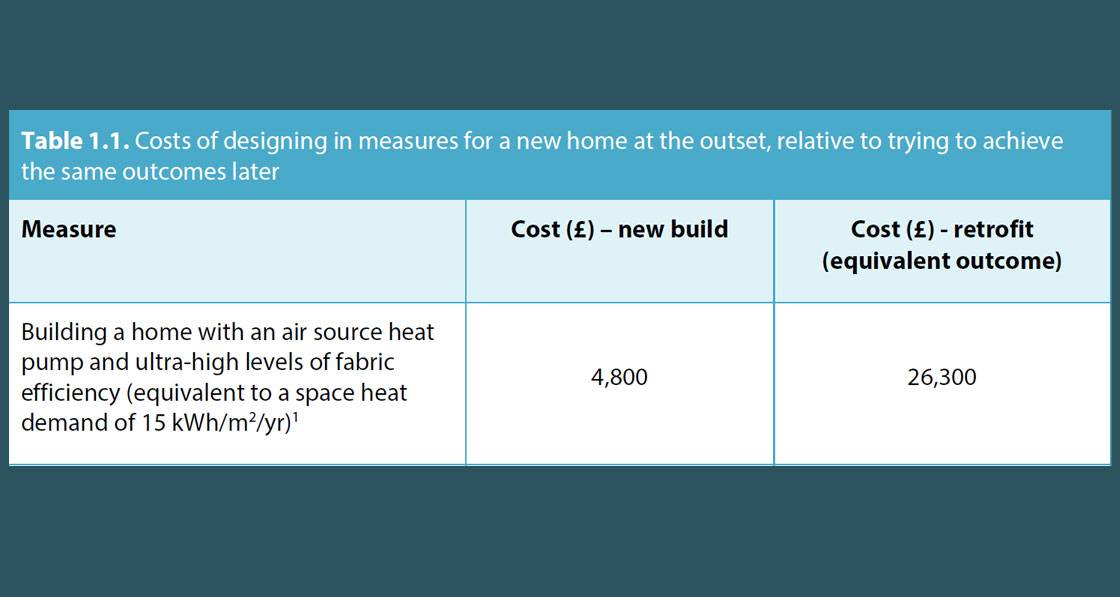
- Climate Change
- Posted
New housing should be to passive house standard — Climate Change Committee
The UK’s official climate change advisor has called on the government to tighten energy efficiency standards for new housing to bring them down, or close to, passive house standard.
This article was originally published in issue 29 of Passive House Plus magazine. Want immediate access to all back issues and exclusive extra content? Click here to subscribe for as little as €10, or click here to receive the next issue free of charge
The call from the Committee on Climate Change is more ambitious than the government’s own 2018 clean growth strategy, which the committee dismissed as “out of step with the urgent timeline needed”. The committee has also called for gas heating to be phased out of new builds within six years, giving way to heat pumps. In its review ‘UK housing: fit for the future?’, the committee expressed dismay that government ambition appeared to be in retreat.
The report said: “Ambitious standards were set under the Zero Carbon Homes policy which would have come into force in 2016, had they not been cancelled. The UK is also signed up to delivering nearly zero energy homes by 2021 under the Energy Performance [of] Buildings directive, although the status of this is now unclear.”
Indeed, a circular letter sent out by the Ministry of Housing in January stated that, “following the existing Building Regulations guidance and relevant Government procurement policies would be an adequate way to demonstrate compliance with the nearly zero energy buildings requirement”.
This is clearly out of step with the European Commission’s advice that new homes should have a maximum primary energy demand of 45 kWh/m2/yr in order to meet the NZEB standard. It is also in stark contrast to other EU countries that have significantly tightened new build standards to meet the directive, and demonstrates a lax approach that may be driven by the UK’s likely imminent exit from the European Union.
The Committee on Climate Change said: “The Government should act now to set an ambitious trajectory of standards, regulations and targets for new homes, ensuring they are fit for 2050 and beyond.” It also called for a “near complete decarbonisation of how we heat our homes”. It also stated: “Our homes must be low-carbon, energy efficient, have safe moisture levels, excellent indoor environmental quality, and be climate resilient. This is not happening at present.”
Additional reporting by Jeff Colley & Lenny Antonelli The committee calculated that the extra cost of building to a 15 kWh/m2/yr standard as opposed to the current building regs level would be around £4,800 per dwelling. These figures call into question the argument that building to higher standards is genuinely unaffordable.
New homes must be built to tight specifications to avoid expensive retrofit later, the committee said. “New build homes should deliver ultra-high levels of energy efficiency as soon as possible, and by 2025 at the latest. This should be consistent with a space heat demand of 15-20 kWh/m2/yr.” The passive house standard is 15 kWh/m2/yr.
The committee commissioned analysis which showed that building to these standards ought only to cost around £4,800 extra per home. By contrast, carrying on building homes the way we do now would incur unaffordable retrofit costs in order to meet climate targets — five times more than getting it right in the first place, the committee says.
In a report also published in February, the Energy and Climate Intelligence Unit (ECIU) pointed out that occupants of new homes could be saving more than £200 per year on their energy bills if the properties had been built to the ditched Zero Carbon Homes standard.
As well as the lack of ambition in the building regulations, the Committee on Climate Change was damning about the performance gap between design and real-world energy efficiency in new homes.
A committee spokeswoman was reported by the Carbon Brief website comparing underperforming homes to the Volkswagen emissions scandal: “[homebuyers] are being told they’re getting really well insulated, sustainable homes [but] these homes are nothing like as good as they should be…to me, this is a scandal of Volkswagen proportions.”
The committee refers to Dame Judith’s Hackitt’s post-Grenfell report on the construction industry, noting the report “highlighted the systemic compliance issues in the current Building Standards regime,” and quoting Dame Judith’s words: “the whole system of regulation… is not fit for purpose, leaving room for those who want to take shortcuts to do so."
The committee makes a clear recommendation: “Overhaul the compliance and enforcement framework so that it ...provides transparent information and a clear audit trail, with effective oversight and sanctions.” “Building control enforcement should also be adequately funded as a matter of urgency,” it adds. To crack down on the performance gap the committee wants actual, not merely estimated, building performance to be regulated.
“‘As-built’ performance should be formally integrated into the standards and enforcement framework. It is critical that stronger compliance and enforcement procedures, with greater levels of inspection and heavy penalties where appropriate, are in place,” it says.
The committee also states: “From 2025 at the latest, no new homes should be connected to the gas grid. They should instead be heated through low carbon sources, have ultra-high levels of energy efficiency alongside appropriate ventilation and, where possible, be timber-framed.”
Decarbonisation requires a dramatic reduction in the heat energy required by our homes, and retrofit of older homes is essential in order to make them ‘heat pump ready’. This requires much more active participation in the transformation by the government, the committee says.
Additional reporting by Jeff Colley & Lenny Antonelli.







